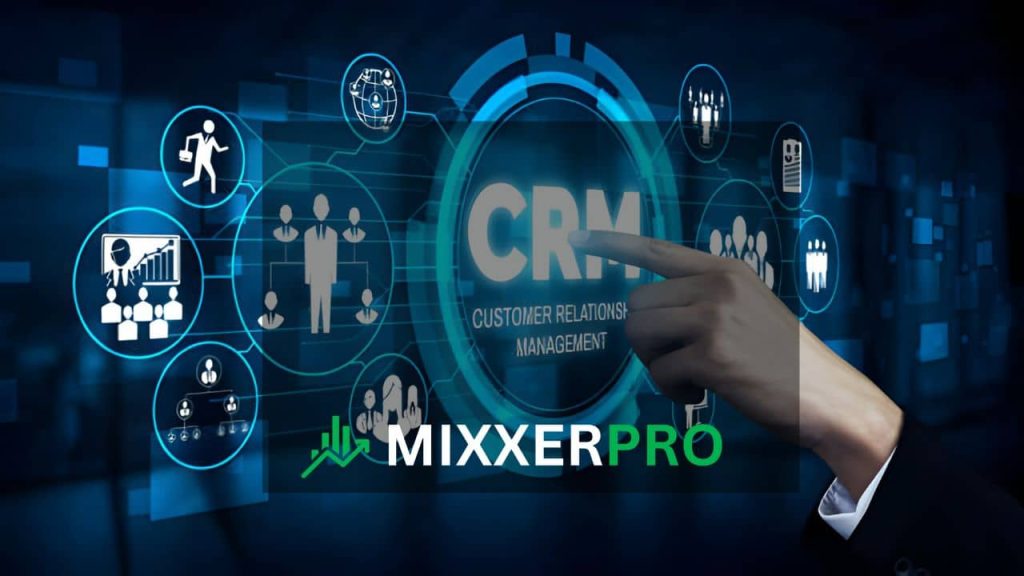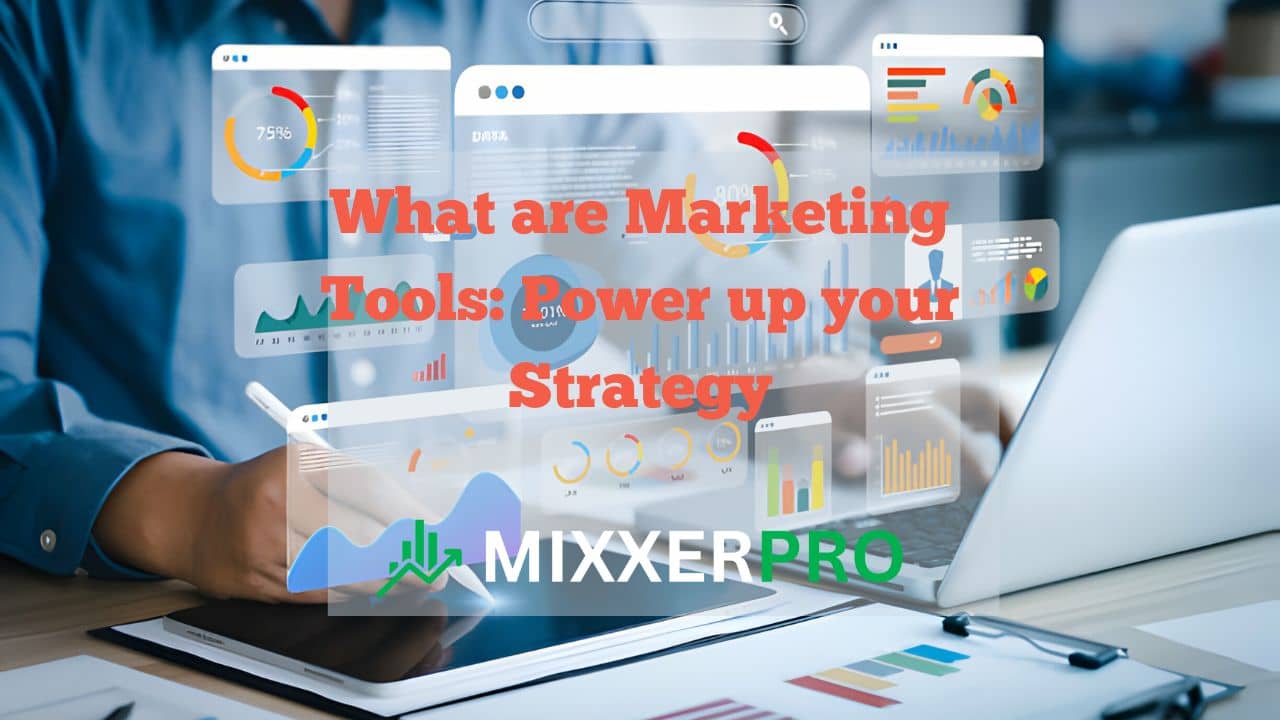What are Marketing Tools: Power up your Strategy
Marketing tools refer to digital software or platforms used by businesses to promote their products or services, analyze market trends, and reach their target audience effectively. In today’s digitally-driven world, marketing tools have become a crucial component for businesses of all sizes.
They offer a range of functionalities, such as email marketing, social media management, customer relationship management (CRM), search engine optimization (SEO) analysis, and analytics tracking, enabling companies to streamline their marketing efforts and maximize their return on investment (ROI). By leveraging these tools, businesses can improve their online visibility, engage with their audience, track campaign effectiveness, and ultimately drive sales.
Whether it’s through email campaigns, social media posts, or data-driven insights, marketing tools provide businesses with the tools they need to succeed in the competitive online landscape.
Table of Contents
Understanding Marketing Tools
Marketing tools are essential for businesses to effectively promote their products and services. These tools include social media platforms, email marketing software, and analytics tools, which help companies reach their target audience and track their marketing efforts.
Understanding Marketing Tools Marketing tools play a crucial role in the success of any business. These tools are essential for analyzing, strategizing, and implementing marketing campaigns to attract and retain customers. In this section, we will explore the importance of marketing tools in business and the connection between these tools and business growth.
Importance Of Marketing Tools In Business
Marketing tools are an integral part of a successful business strategy. They provide valuable insights into customer behavior, market trends, and competitor analysis. By utilizing marketing tools, businesses can make informed decisions, optimize their marketing efforts, and achieve better results. Let’s delve into the key reasons why marketing tools are important:
1. Efficient Planning and Execution: Marketing tools help businesses plan and execute marketing campaigns more efficiently. These tools provide valuable data and analytics, enabling companies to identify their target audience, create personalized content, and determine the most effective channels for reaching their customers. With the right tools, businesses can streamline their marketing efforts and allocate resources for maximum impact.
2. Data-driven Decision Making: In today’s data-driven world, businesses need to base their decisions on facts rather than assumptions. Marketing tools help collect and analyze valuable data, such as customer demographics, preferences, and buying behavior. By leveraging this data, businesses can make informed decisions regarding product development, pricing, promotions, and distribution channels. This data-driven approach minimizes risks and maximizes the chances of success.
3. Real-time Insights: Marketing tools provide real-time insights into the effectiveness of marketing campaigns. Businesses can track and measure key performance indicators (KPIs) such as website traffic, conversion rates, email open rates, and social media engagement. These insights enable businesses to identify what works and what doesn’t, allowing them to adjust their strategies in real-time for better results.
The Connection Between Marketing Tools And Business Growth
Marketing tools have a direct impact on business growth. Here’s how:
1. Increased Visibility and Reach: Effective marketing tools help businesses increase their visibility and reach in the market. By analyzing consumer behavior and market trends, businesses can create targeted marketing campaigns that resonate with their target audience. This targeted approach ensures that their message reaches the right people, increasing brand awareness and attracting potential customers.
2. Improved Customer Engagement and Loyalty: Marketing tools allow businesses to engage with their customers on a more personal level. With tools like customer relationship management (CRM) systems and marketing automation software, businesses can nurture relationships with their customers through personalized emails, targeted offers, and tailored content. By consistently providing value to their customers, businesses can build loyalty and drive repeat sales.
3. Competitive Advantage: Marketing tools provide businesses with a competitive edge. By analyzing competitor strategies, businesses can identify gaps in the market and create innovative marketing campaigns to differentiate themselves. By staying on top of the latest trends and leveraging marketing tools effectively, businesses can outperform their competitors and achieve sustained growth. In conclusion, marketing tools are vital for businesses to succeed in today’s competitive landscape. They enable businesses to plan and execute marketing campaigns efficiently, make data-driven decisions, and achieve business growth. By leveraging these tools effectively, businesses can stay ahead of the competition and achieve their marketing objectives.
Categories Of Marketing Tools
When it comes to marketing, having the right tools at your disposal can make all the difference in your success. Marketing tools can help you streamline your strategies, automate tasks, analyze data, and reach your target audience effectively. In this blog post, we will explore the different categories of marketing tools and how they can benefit your business. Let’s dive in!
Digital Marketing Tools
Digital marketing tools are designed to help businesses reach customers through online channels. These tools leverage the power of the internet to promote products or services, build brand awareness, and increase website traffic. Here are some popular types of digital marketing tools:
- Search Engine Optimization (SEO) tools: These tools help optimize your website for search engines, improve its visibility, and drive organic traffic.
- Content marketing tools: Content is king in the digital world, and these tools assist in creating, publishing, and promoting content to attract and engage your target audience.
- Social media management tools: These tools enable you to schedule posts, analyze performance, and manage multiple social media accounts from a central platform.
- Email marketing tools: From building email lists to designing compelling newsletters and monitoring campaign metrics, these tools simplify the entire email marketing process.
- Analytics tools: These tools provide valuable insights into your website’s performance, user behavior, and conversion rates, and help you make data-driven marketing decisions.
Traditional Marketing Tools
Despite the shift towards digital marketing, traditional marketing tools still hold their ground and can be effective in reaching a particular target audience. Here are some examples of traditional marketing tools:
- Print media: Newspapers, magazines, brochures, flyers, and direct mail are still widely used by businesses to reach offline consumers.
- Television and radio ads: These platforms allow businesses to reach a mass audience, creating brand awareness and promoting products or services.
- Outdoor advertising: Billboards, posters, and signage are effective ways to capture attention and generate awareness among people who pass by.
- Events and sponsorships: Participating in trade shows, conferences, or sponsoring local events can help businesses connect with their target audience directly.
- Word-of-mouth marketing: Encouraging satisfied customers to spread the word about your business is a powerful traditional marketing tool.
Hybrid Marketing Tools
Hybrid marketing tools combine the best of both digital and traditional marketing strategies. These tools bridge the gap between offline and online marketing efforts, allowing businesses to maximize their reach and engagement. Here are a few examples of hybrid marketing tools:
| Tools | Description |
| SMS marketing platforms | Send targeted messages and promotions directly to customers’ mobile phones. |
| Location-based advertising | Show ads to potential customers when they are near your business location. |
| QR codes | Print QR codes on offline marketing materials to drive traffic to your website or landing page. |
| Interactive kiosks | Place interactive kiosks in physical locations to provide customers with product information and collect data. |
| Augmented Reality (AR) experiences | Create immersive experiences that blend the physical and digital world, enhancing customer engagement. |
By leveraging these hybrid marketing tools, businesses can create a cohesive marketing strategy that encompasses both online and offline channels, providing a seamless brand experience for their customers.
Essential Digital Marketing Tools

When it comes to digital marketing, having the right tools in your arsenal is essential to ensure success. These tools not only help you improve your online presence but also enable you to engage with your audience and communicate with them on a personalized level. In this blog post, we will explore three key digital marketing tools that are indispensable for any business looking to thrive in today’s competitive landscape.
Seo Tools To Improve Online Presence
Search Engine Optimization (SEO) is the cornerstone of any successful digital marketing strategy. By optimizing your website for search engines, you can improve its visibility and increase the organic traffic it receives. To achieve this, you need robust SEO tools that provide valuable insights and help you implement effective optimization techniques. Here are some essential SEO tools that every marketer should have:
- Google Analytics: This powerful tool allows you to track and analyze website traffic, user behavior, and conversion rates. It provides valuable data that can help you make informed decisions to improve your online presence.
- Keyword Research Tools: Tools like Google Keyword Planner and Ahrefs Keywords Explorer help you identify relevant keywords with high search volumes and low competition. By incorporating these keywords into your website content, you can improve your search engine rankings.
- Backlink Analysis Tools: Tools like Moz Link Explorer and Ahrefs Site Explorer allow you to analyze your website’s backlink profile. By monitoring your backlinks, you can identify opportunities for link-building and ensure that you have a healthy and authoritative link profile.
Social Media Management For Audience Engagement
Social media platforms play a crucial role in engaging with your audience and building brand awareness. Effective social media management tools allow you to streamline your social media efforts, save time, and analyze the effectiveness of your campaigns. Here are two essential tools for managing your social media presence:
- Hootsuite: Hootsuite is a popular social media management tool that allows you to schedule posts, monitor mentions, engage with your audience, and measure the performance of your social media campaigns.
- Sprout Social: Sprout Social is another powerful tool that provides comprehensive social media management features. It enables you to collaborate with your team, plan and schedule content, monitor brand mentions, and analyze the effectiveness of your social media efforts.
Email Marketing For Personalized Communication
Email marketing remains one of the most effective and personalized communication channels for businesses. It enables you to reach your audience directly and tailor your messages based on their preferences and behaviors. To execute successful email marketing campaigns, you need the following essential tools:
- Mailchimp: Mailchimp is a popular email marketing tool that allows you to create and send professional-looking emails, manage your subscriber lists, and automate your email campaigns. It provides valuable insights into the performance of your campaigns and helps you optimize your email marketing strategy.
- ActiveCampaign: ActiveCampaign is an advanced email marketing automation platform that goes beyond basic email marketing features. It offers powerful automation workflows, audience segmentation, personalized content recommendations, and robust analytics to help you deliver highly targeted and engaging email campaigns.
Leveraging Analytics And Data
Leveraging analytics and data is crucial for modern businesses to stay competitive and make informed decisions. Marketing tools offer various ways to gather and analyze data, providing valuable insights that can drive marketing strategies and improve overall performance. In this blog post, we will explore two essential marketing tools that help leverage analytics and data: web analytics for understanding customer behavior and CRM tools to track and manage customer interactions.
Web Analytics For Understanding Customer Behavior
Web analytics tools allow businesses to track and analyze website traffic, providing valuable data on customer behavior, preferences, and engagement. By leveraging these tools, marketers can gain insights into how visitors interact with their website, which pages are most popular, how long visitors stay on each page, and what actions they take before leaving.
This data helps marketers understand customer preferences, identify areas for improvement, and optimize website performance. For example, if a specific page has a high bounce rate, marketers can investigate why visitors are leaving without taking any action and make necessary improvements to increase engagement and conversion rates.
- Tracking website traffic and visitor demographics
- Identifying popular pages and areas for improvement
- Measuring engagement and conversion rates
- Monitoring the effectiveness of marketing campaigns
| Tool | Description |
| Google Analytics | A free, widely used web analytics tool with a comprehensive set of features |
| Adobe Analytics | An enterprise-level analytics platform offering advanced features and integrations |
| Hotjar | A heat mapping and user feedback tool for understanding website usability |
CRM Tools To Track And Manage Customer Interactions

Customer Relationship Management (CRM) tools help businesses track and manage customer interactions throughout the marketing and sales processes. These tools allow marketers to maintain a centralized database of customer information, including contact details, purchase history, preferences, and communication history.
With CRM tools, marketers can analyze customer data, segment audiences, and personalize marketing messages for improved targeting and relationship building. Additionally, CRM tools enable better collaboration between sales and marketing teams, ensuring a seamless customer experience from initial contact to conversion.
- Centralizing customer data for easy access and analysis
- Segmenting audiences for targeted marketing campaigns
- Personalizing marketing messages based on customer preferences
- Improving collaboration between sales and marketing teams
- HubSpot CRM: A free CRM platform with robust features and integrations
- Salesforce: A leading CRM solution used by many enterprises for comprehensive customer management
- Zoho CRM: A user-friendly CRM tool suitable for small to medium-sized businesses
Creative Solutions In Marketing
In today’s highly competitive digital landscape, businesses need to constantly find innovative ways to grab and retain the attention of their target audience. This is where creative solutions in marketing play a vital role. Creative marketing entails using out-of-the-box strategies, engaging content, and captivating visuals to effectively communicate your brand’s message to potential customers. In this blog post, we will explore the role of graphic design tools for creating visuals and video creation tools for dynamic content in marketing.
Graphic Design Tools For Creating Visuals
Visuals are a powerful marketing tool as they can instantly captivate attention and leave a lasting impression. Graphic design tools are essential for creating visually appealing content that can effectively convey your brand’s story, products, and value propositions.
With a plethora of graphic design tools available in the market, it can be overwhelming to choose the right one for your needs. Here are some popular choices:
- Adobe Photoshop: A versatile and powerful tool used by professionals for creating and editing images, illustrations, and graphics.
- Canva: A user-friendly online tool that offers a wide range of customizable templates and design elements.
- Sketch: A digital design toolkit specifically designed for web and mobile app designers, providing a seamless workflow.
Video Creation Tools For Dynamic Content
Incorporating videos into your marketing strategy is becoming increasingly important in today’s visually-driven world. Videos have a higher chance of engaging and resonating with your audience, resulting in increased brand awareness and conversions. Here are some video creation tools that can help you create dynamic content:
- Adobe Premiere Pro: A professional-grade video editing software used by videographers and filmmakers to create high-quality videos with advanced features.
- Animoto: A user-friendly and cloud-based tool that allows you to easily create videos using pre-designed templates, photos, and videos.
- Wondershare Filmora: A beginner-friendly video editing software that offers a wide range of effects, filters, and transitions to enhance your videos.
By utilizing these video creation tools, you can unleash your creativity and create compelling videos that will resonate with your target audience, ultimately boosting your marketing efforts.
Automation In Marketing
The use of automation in marketing has revolutionized the way businesses reach and engage with their target audience. By using marketing automation software, companies can streamline their processes, save time, and improve overall efficiency. In this post, we will explore the concept of automation in marketing, focusing on how marketing automation software works and the benefits it brings.
Marketing Automation Software Explained
Marketing automation software refers to a set of tools and technologies that enable businesses to automate repetitive tasks in their marketing efforts. These software solutions are designed to handle various marketing activities, such as email marketing, social media scheduling, lead nurturing, and customer relationship management (CRM).
With marketing automation software, businesses can set up workflows and automated campaigns that trigger specific actions based on predetermined conditions. For example, when a visitor fills out a contact form on a website, the software can automatically send a personalized email thanking them for their inquiry and providing more information about the business.
Moreover, marketing automation software can track and analyze customer interactions and behaviors, creating detailed reports and insights that businesses can use to improve their marketing strategies. These tools often integrate with other marketing platforms, allowing for seamless data sharing and collaboration within the marketing team.
The Benefits Of Automating Repetitive Tasks
The adoption of marketing automation software brings a wide range of benefits to businesses, particularly by automating repetitive tasks. Here are some key advantages:
- Saves Time: Automating repetitive tasks frees up time for marketing teams to focus on more strategic initiatives. Instead of manually sending out individual emails, the software can automate the process, saving hours of manual work.
- Improves Efficiency: By automating tasks, businesses can reduce human error and ensure consistency in their marketing campaigns. Workflow automation also enables seamless collaboration between team members, leading to improved efficiency and productivity.
- Enhances Personalization: Marketing automation software allows businesses to create personalized experiences for customers. By leveraging data and analytics, companies can deliver targeted content and messages based on individual preferences and behaviors.
- Increases Lead Conversion: By nurturing leads through automated campaigns, businesses can increase the chances of conversion. Timely and personalized interactions with leads help build trust and provide relevant information, ultimately driving them toward making a purchase.
- Optimizes Marketing Budgets: Marketing automation software provides valuable insights and analytics that help businesses measure the effectiveness of their marketing efforts. By identifying which campaigns generate the highest return on investment (ROI), companies can allocate their budgets more efficiently.
Overall, automation in marketing streamlines processes, improves efficiency and allows businesses to deliver personalized experiences to their customers. By leveraging marketing automation software, companies can optimize their marketing efforts and drive better results.
Social Media Interactions

Social media interactions play a crucial role in the success of a marketing campaign. With billions of people active on various social media platforms, businesses have an unprecedented opportunity to increase their brand visibility, engage with their audience, and drive traffic to their websites. However, to make the most out of social media interactions, businesses need to leverage the power of marketing tools specifically designed to enhance their social media strategy.
Tools To Boost Social Media Strategy
When it comes to social media marketing, having the right tools can make a world of difference. These tools automate repetitive tasks, streamline workflows, and provide valuable insights that help businesses optimize their social media strategy. Here are some powerful tools that can supercharge your social media marketing efforts:
| Tool | Features |
| Social media management platforms | Schedule posts across multiple platformsMonitor brand mentions and engage with followersAnalyze performance with detailed reports |
| Social listening tools | Measure engagement, reach, and conversion rates to identify top-performing content and optimize future campaigns track audience demographics and behavior |
| Social media analytics tools | Measure engagement, reach, and conversion rates to identify top-performing content and optimize future campaigns to track audience demographics and behavior |
Analyzing Engagement Across Multiple Platforms
With the vast array of social media platforms available, businesses need to ensure they are effectively engaging with their audience on each platform. Analyzing engagement across multiple platforms can help businesses identify which platforms generate the most significant impact, allowing them to allocate resources accordingly. Here are some key metrics to consider when analyzing social media engagement:
- Number of likes, comments, shares, and retweets
- Click-through rates (CTR) on shared links
- Reach and impressions
- Conversion rates from social media to website
By regularly monitoring and analyzing these metrics, businesses can gain valuable insights into their audience’s preferences and behavior, enabling them to refine their social media strategy and drive better results.
Collaboration And Project Management
Marketing tools play a crucial role in collaboration and project management by facilitating effective communication, streamlining workflows, and maximizing productivity. These tools enable teams to collaborate seamlessly, track project progress, manage tasks, and analyze performance, ensuring successful marketing campaigns.
Tools That Enhance Team Collaboration
In today’s fast-paced business environment, effective collaboration and project management are essential for successful marketing campaigns. Companies need to ensure that their teams are working together efficiently, sharing ideas and resources, and staying on track with project deadlines. Fortunately, there are several marketing tools available that can improve collaboration and streamline project management. These tools provide features designed to enhance communication, coordination, and organization within marketing teams. Let’s explore some of these valuable tools in more detail:
Managing Marketing Projects Effectively
When it comes to managing marketing projects effectively, companies need tools that allow teams to collaborate seamlessly. These tools promote real-time communication, task tracking, and project monitoring, ensuring that everyone is on the same page. With these features, teams can align their efforts, avoid duplicating work, and make informed decisions. Some popular collaboration and project management tools used in marketing include:
- Trello: Trello is a versatile project management tool that helps teams organize and prioritize tasks by using boards, cards, and lists. It allows team members to see project progress, assign tasks to specific individuals, and communicate within each task card. With Trello, managing marketing projects becomes easier, as it provides a visual overview of the entire workflow.
- Asana: Asana is a powerful tool that promotes collaboration and project management by allowing users to create task lists, delegate responsibilities, set deadlines, and track progress. It offers a range of features, including kanban boards, timelines, and Gantt charts, making it ideal for managing complex marketing projects. With Asana, teams can collaborate effectively and ensure that projects are completed on time and within budget.
- Slack: Slack is a popular communication platform that enables teams to collaborate and stay connected in real time. With features such as channels, direct messaging, and file sharing, Slack provides a central hub for team communication. It integrates with various project management tools, allowing teams to receive updates, share files, and discuss project details seamlessly.
These tools not only enhance team collaboration but also contribute to improved productivity, transparency, and accountability. By utilizing these resources, marketing teams can streamline their processes, increase efficiency, and drive better results. With effective collaboration and project management, companies can maximize their marketing efforts and achieve their goals efficiently.
Content Creation And Optimization
Marketing tools play a crucial role in content creation and optimization, helping businesses enhance their online presence. These tools aid in keyword research, content planning, and performance tracking, enabling marketers to develop effective strategies and attract targeted audiences.
Content creation and optimization are essential elements of any successful marketing strategy. With high-quality and optimized content, it becomes easier to capture the attention of your target audience and rank well in search engine results. In today’s competitive digital landscape, marketers need to utilize specific tools that can help streamline the content creation process and maximize its impact.
Content Management Systems (CMS)
A content management system is a software application that allows marketers to create, edit, organize, and publish content on their websites. It provides a user-friendly interface and simplifies the entire content creation process. One of the most popular CMS platforms is WordPress, known for its extensive range of themes, plugins, and customization options.
With a CMS like WordPress, marketers can easily create and manage blog posts, landing pages, and other website content. Its intuitive editor enables you to format text, insert images and videos, add hyperlinks, and make your content visually appealing. Moreover, CMS platforms often come with built-in SEO features, allowing you to optimize your content for search engines effortlessly.
Tools For Keyword Research And Content Optimization
Effective keyword research is the foundation of content optimization. By understanding the words and phrases your target audience is searching for, you can create relevant and engaging content that drives organic traffic to your website. To assist marketers in this process, numerous tools are available to uncover valuable keywords with high search volumes and low competition.
Google Keyword Planner is a powerful tool that helps identify relevant keywords for your content. It provides search volume data, competition metrics, and keyword suggestions based on your input. By utilizing the data from Google Keyword Planner, you can optimize your content’s titles, headings, meta tags, and body text with the most relevant keywords.
Another valuable tool for content optimization is SEMrush. This all-in-one marketing suite not only assists with keyword research but also offers features like content analysis and SEO recommendations. SEMrush allows you to examine your competitors’ organic rankings, study their content strategies, and discover new opportunities for optimization.
| Tool | Key Features |
| Google Keyword Planner | Keyword research content analysis competitor research recommendations |
| SEMrush | Keyword research content analysisCompetitor research recommendations |
These tools help marketers optimize their content by incorporating relevant keywords, improving the readability and structure of their texts, and enhancing other SEO elements. By utilizing tools like Google Keyword Planner and SEMrush, you can create content that not only resonates with your audience but also attracts search engine traffic.

Credit: www.simplilearn.com
Understanding What Are Marketing Tools
Marketing tools play a crucial role in today’s digital world, helping businesses reach their target audience, analyze data, and optimize campaigns. From email marketing platforms to social media management tools, these resources are essential for successful marketing strategies. With the right tools, businesses can effectively promote their products and services, as well as track and measure their overall marketing performance.
Defining The Term What Are Marketing Tools
Marketing tools are essential instruments that businesses and marketers use to reach their target audience, promote their products or services, and ultimately drive sales. These tools encompass various strategies, techniques, and channels that enable businesses to engage with their customers in a meaningful way. By using the right marketing tools, companies can enhance their brand visibility, expand their customer base, and achieve their marketing goals more effectively.
The Role Of Marketing Tools In Strategic Planning
Marketing tools play a vital role in strategic planning as they empower businesses to devise comprehensive marketing strategies and campaigns. These tools provide valuable insights and data that assist marketers in understanding their target market, identifying customer needs and preferences, and creating personalized and impactful marketing messages.
By leveraging marketing tools like market research surveys, customer analytics software, and social media listening tools, businesses can gather relevant data and consumer feedback. This data allows them to refine their marketing strategies, make data-driven decisions, and tailor their campaigns to better resonate with their target audience.
Moreover, marketing tools aid in the segmentation and targeting of specific customer segments, enabling businesses to allocate their marketing resources more efficiently.
Tracking And Enhancing Performance
When it comes to marketing, it is crucial to track and enhance the performance of your campaigns. By closely monitoring and analyzing data, you can understand what is working and what needs improvement. This allows you to optimize your strategies and maximize your return on investment (ROI).
Performance Tracking For Roi Calculation
To determine the success of your marketing efforts, it is essential to track performance metrics and calculate your return on investment (ROI). Performance tracking tools provide valuable insights into the effectiveness of your campaigns, allowing you to make data-driven decisions.
By tracking metrics such as website traffic, click-through rates (CTRs), conversion rates, and sales revenue, you can assess how well your marketing campaigns are performing. This information enables you to identify which strategies are generating the best results and allocate your resources accordingly.
With performance tracking tools, you can also measure the ROI of your marketing initiatives. These tools enable you to track the costs associated with your campaigns and compare them to the revenue generated. By calculating your ROI, you can evaluate the profitability of your marketing activities and make informed decisions about where to focus your efforts.
A/b Testing Tools And Their Significance In Marketing
A/B testing, also known as split testing, is a powerful technique used in marketing to compare the performance of different elements within a campaign. A/B testing tools allow you to test variations of your marketing materials, such as landing pages, emails, and ad creative, to determine which version performs better.
Through A/B testing, you can experiment with different headlines, images, call-to-action buttons, and other elements to identify the ones that resonate most with your target audience. By systematically testing and analyzing the results, you can optimize your campaigns for maximum engagement and conversions.
Incorporating A/B testing into your marketing strategy provides valuable insights into customer preferences, allowing you to fine-tune your messaging and design. This iterative process of testing and refining can lead to significant improvements in campaign performance and ultimately drive better results for your business.
Frequently Asked Questions On What Are Marketing Tools
What’s A Marketing Tool?
A marketing tool is a resource or software used to promote products or services in a targeted way, assisting businesses in reaching and engaging their intended audience. It aids in tasks such as market research, advertising, social media management, email campaigns, and analytics.
What Are The 4 Marketing Tools?
The four marketing tools are product, price, place, and promotion. These tools help businesses create and implement their marketing strategies effectively.
What Is The Most Popular Marketing Tool?
The most popular marketing tool is social media, offering vast audience reach and engagement opportunities.
What Are The 5 Tools You Think Every Marketer Should Use?
To enhance marketing strategies, five essential tools are recommended- Google Analytics for tracking website performance, SEMrush for competitive analysis, Hootsuite for social media management, MailChimp for email marketing, and Canva for creating visually appealing designs.
Conclusion
To summarize, marketing tools play a crucial role in the success of any business. These tools, such as analytics software, social media platforms, and email marketing tools, enable businesses to reach their target audience effectively and track their marketing efforts.
By utilizing these tools, businesses can optimize their marketing strategies, increase their online visibility, and drive more traffic to their website. Ultimately, marketing tools empower businesses to stay competitive in the digital world and achieve their marketing goals.




